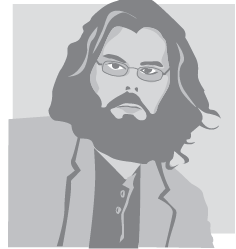 aNewDomain — Empathy is the ability to experience another’s emotions, pain or state as if they are your on. Compassion is the ability to know others are entities just like you, with the same feelings, desires and needs.
aNewDomain — Empathy is the ability to experience another’s emotions, pain or state as if they are your on. Compassion is the ability to know others are entities just like you, with the same feelings, desires and needs.
Which one do you need?
I’m in Breckenridge, CO for a retreat this week. Existential international psychologists from the US, Canada, China, Singapore, Malaysia, Taiwan, Indonesia, Borneo and the Phillipines are gathered here. The point is to talk philosophy, eat together, experience the peaceful idyll of the Colorado mountains, eat some more, share one another’s space and gravity and eat again. 
This isn’t canned nature up here; it’s the real thing – but it’s a particular kind of nature. It’s privileged nature.
Almost everyone in Breckenridge is white and privileged.
There are poor(ish) people – someone has to check out the groceries at the Safeway and tidy up the rooms – but mostly the place keeps working slobs out of sight or behind the counters. But by and large, most people here are awfully privileged.
And many of these people of privilege claim a faith. Like Buddhism. Christianity. Both tout a certain amount of compassion as being central to their practices.
But it is hard to have functional compassion when you experience a lot of privilege. That’s because compassion means knowing that other beings are entities just like you.
 But sometimes, other beings are not like you at all.
But sometimes, other beings are not like you at all.
They have the same desires, sure.
They want sex, beer, food, sunlight, positive regard and a car with six cupholders, just like everyone else.
But there are so many people who have different wants, wants that are informed by different needs. These are largely unmet needs that privilege blinds one to.
Like health insurance. Reproductive healthcare. Soup. A warm hat. Buses that run at least vaguely on-time.
When you’re driving an $80,000 car to work in the morning, it’s nearly impossible to look at the woman sitting in the rain at the bus stop with all of her groceries around her and think: Hell, I should stop and give her a ride.
Empathy vs Compassion: Which One Rules You?
What about empathy?
Empathy alone doesn’t get the job done, either. A friend of mine shared a piece of her art with me yesterday. Now I don’t understand art. I never have. Looking at it always makes me feel like a five-year-old in a calculus class. Utterly lost. I think to myself: Are these good paintings or bad paintings? What am I meant to take from this experience?
And: Why are you showing me this? Why don’t those dancers feel silly?
But this time was different. As she shared her art, I cried the whole time. I had no idea what I was crying about, only that the weight of tears was unbearable. They had to be let go.
As it turned out, I was sharing in her grief and this, she said, is the point of art: to share, express, communicate things that cannot be stated plainly in text, to transcend the banality of language.
I’m pretty sensitive to these affective communications, these emotional punch-outs.
Walking through an art gallery is completely exhausting. It’s like walking along a hallway lined with real people really suffering. Like MacLean’s “frameless heads on aimless walls.”
It’s all of the empathy, but none of the meaning.
Do psychopaths experience empathy?
Sure, but not in the way you might think.
Psychopaths can in fact experience functional empathy. They can understand the emotions of others, and they can experience those feelings. But they have sort of an emotional dimmer switch, so they only can experience empathy when it is convenient.
What is really missing, then, from the psychopath? Why does the psychopath use their experience of empathy to be more effective psychopaths rather than falling in love with humanity, being inspired to agape?

Because they lack compassion.
It is these two tools, both sharpened and at the ready, that help us hoe the row. Your understanding of people must be informed by an emotional connection and, equally, by a need to do right by them.
For aNewDomain, I’m Jason Dias, and it’s time to eat.
Image one: Jason Dias for aNewDomain, All Rights Reserved; image two: JSchumacher.typepad.com, All Rights Reserved. image three: “DumplingFillings” by David. Original uploader was Kcdtsg at en.wikipedia – Transferred from en.wikipedia; transferred to Commons by User:Ppntori using CommonsHelper. Licensed under Public Domain via Commons. Cover image: “William-Adolphe Bouguereau (1825-1905) – At the Edge of the Brook (1879)” by William-Adolphe Bouguereau – Unknown. Licensed under Public Domain via Wikimedia Commons.













